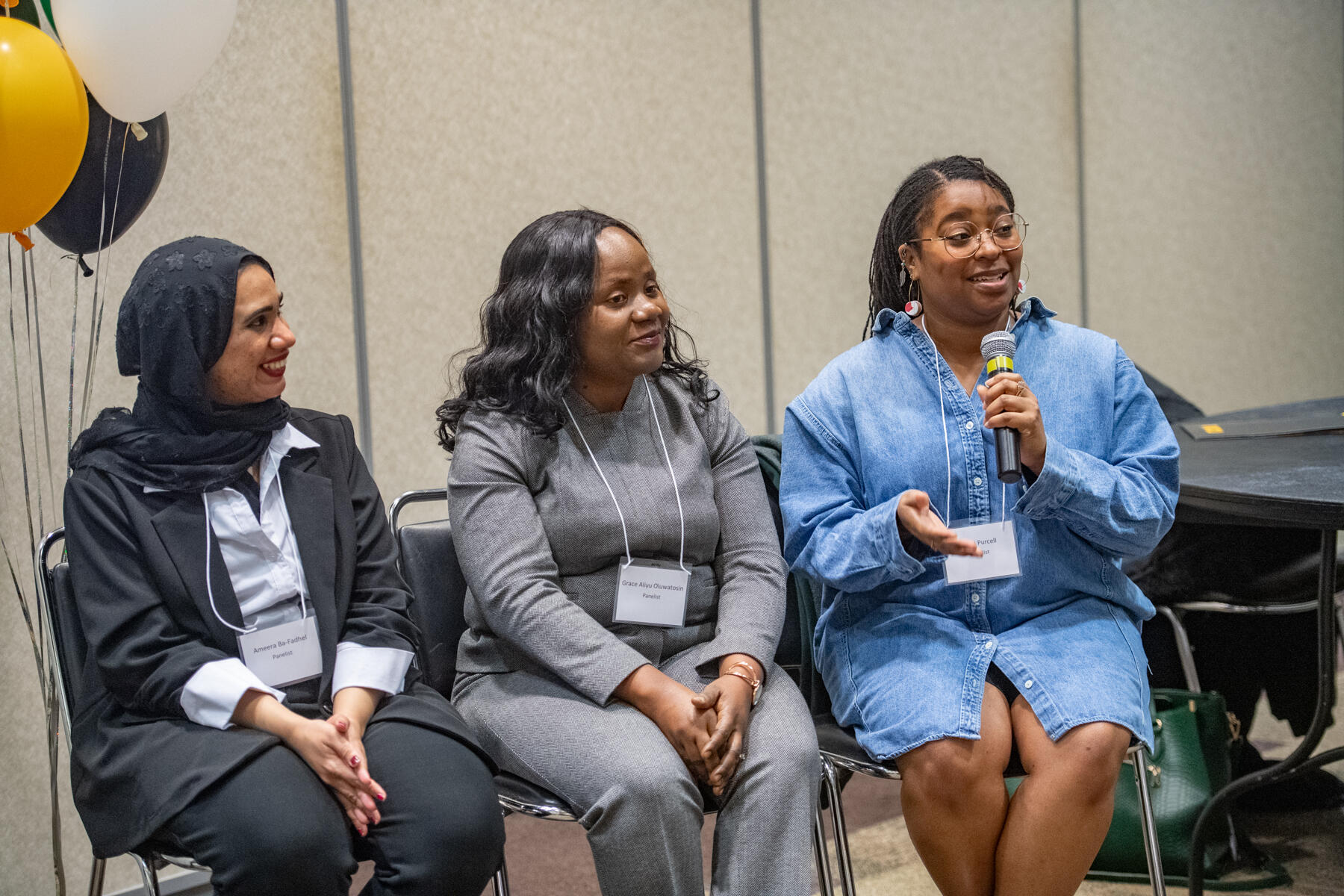
Feb. 14, 2025
Global Education Office’s Black and Abroad conference looks to expand diversity in international study
Share this story
Studying abroad is a transformative experience for college students, but the world isn’t always a welcoming place. Last week, as part of Black History Month, Virginia Commonwealth University’s Global Education Office organized the Black and Abroad: Global Leadership Conference, a daylong mini-conference that explored the challenges and opportunities of global citizenship through the lens of Black identity.
“Only about 10% of U.S. college students end up studying abroad during their undergraduate studies,” said Stephanie Tignor, director of global learning in the GEO. “But out of that number, only about 5% or 6% of students that study abroad are Black, and the percentage of Black students who study abroad is disproportionately lower than the overall percentage of Black students enrolled in U.S. colleges and universities.”
At Black and Abroad, held Feb. 7 in University Student Commons, speakers shared their experiences studying abroad and offered students a chance to ask questions and get insight from those with a similar background.
Keynote speaker Shay Lumpkin, coordinator of the Ronald E. McNair Post-baccalaureate Achievement Program in VCU’s TRiO Programs, reflected on how being a Black woman at the University of Leicester in the United Kingdom shaped her perspective. Her address was titled “Traveling the World They Said Would Never Be Ours,” and she noted how the term “Black and Abroad” is more than a description.
“The phrase reflects a growing community of Black scholars reclaiming and expanding representation. It’s about visibility, empowerment and breaking those historical narratives,” Lumpkin said. “At its core, Black and Abroad is not just a statement that sounds cool, but it’s a celebration affirming us – that Black people belong in every part of the world, that our presence is impactful and that our stories deserve to be told on a global scale every day of the year.”
From her time in Leicester, Lumpkin recalled being confronted with the tension that a seemingly simple question can spark.
“One afternoon after being introduced to a few new students. I was met with, ‘Where are you from?’” she said. After replying that she was from the U.S., “looks of confusion were quickly met with, ‘No, girl, where are you from?’”
Lumpkin said she explained her understanding of the question and, instead of turning away from potential conflict with new acquaintances, “chose to step deeper into that discomfort – to use this as my first opportunity to engage in dialogue around what ‘where you are from?’ means for them versus what that meant for me and how I could better understand them as my new friends. At times I felt that my identity was under attack, but instead of falling victim to the discomfort, I leaned into it and sought a new form of enlightenment.”
Lumpkin said that episode, and her full study abroad experience, highlighted the role that she and today’s Black students play in the realm of international education.
“Our presence in global spaces is a declaration that Black travelers are the historians, the cultural ambassadors, the educators and the change-makers the world needs,” she said.
Previously staged as a panel discussion among students who studied overseas, Black and Abroad was expanded this year to include a larger scope of presentations with broader topics and target audiences. Black international students, Black faculty who have led study abroad programs, and Black alumni and scholars were among those reflecting on their experiences in global learning – and the benefits of studying abroad.
Among sessions at this month’s Black and Abroad conference, which was spearheaded by global learning specialists Kelly Richard and Alex Heyden from the Global Education Office:
- In “Building Your Global Tribe,” Jackie Otieno, a health psychology student at VCU, explored how to foster meaningful connections in establishing cross-cultural settings.
- In “Navigating Discomfort as a Black Student Abroad,” undergraduates Nonso Akunwafor and Brittney Cates of the Urban Studies Student Association shared how leaning into their identity helped overcome some of the tension of studying abroad.
- In “Can Study Abroad Reinforce Black Identity?” associate research professor John Fife, Ph.D., and undergraduate Koryn Shaw discussed the impact of a study abroad experience in Brazil on the identity of Black faculty and students born in various parts of the world.
- In a GEO alumni panel, participants revealed how study abroad and international experiences have shaped their careers, studies and lives, as well as some tips for maximizing the long-term impact.
- In “Familiar Struggles,” Cydny A. Neville, a Ph.D. candidate in education leadership, policy and justice, outlined her experiences in East and South Africa, and the common challenges faced by Black individuals in America and Africa.
Students attending Black and Abroad this month said the conference’s messages resonated with them, whether from their own experiences studying abroad or their aspirations to do so.
“I came today to get insight on the experiences of studying abroad being Black, and how to adjust to doing so, and just to get perspective from fellow Black students,” Gary Hare said.
Subscribe to VCU News
Subscribe to VCU News at newsletter.vcu.edu and receive a selection of stories, videos, photos, news clips and event listings in your inbox.










